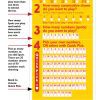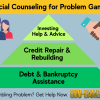Picture this: you’re sitting at a poker table, the thrill of the game coursing through your veins. The cards are dealt, the bets are made, and a surge of anticipation fills the air. But as the night wears on, you find yourself unable to walk away, compelled to keep playing. Why can’t you stop gambling?
Well, my friend, that’s the question we’re going to explore together. Whether it’s the allure of the casino, the excitement of the slot machines, or the adrenaline rush of sports betting, gambling can become a gripping addiction that’s tough to shake off.
But fear not, because in this article, we’ll delve into the reasons why some people find it hard to stop gambling. So let’s buckle up and take a deep dive into the captivating world of gambling addiction. Are you ready? Let’s go!

Why Can’t I Stop Gambling?
Gambling addiction is a complex and often misunderstood issue that affects millions of people worldwide. It can have devastating consequences on individuals and their loved ones, leading to financial ruin, relationship problems, and even mental health disorders. Despite the negative consequences, many struggle to break free from the grip of gambling addiction. In this article, we will delve into the reasons why some individuals find it difficult to stop gambling, exploring the psychological, biological, and social factors that contribute to this behavior.
The Thrill of the Chase
One of the primary reasons why individuals find it difficult to stop gambling is the exhilaration and excitement that comes with it. The act of placing a bet or participating in a game of chance releases dopamine, a neurotransmitter associated with pleasure and reward, in the brain. This dopamine rush can create a euphoric feeling and reinforce the desire to engage in gambling activities.
Beyond the immediate pleasure, the unpredictable nature of gambling creates a sense of anticipation and expectancy. The hope of winning big or experiencing a lucky streak can be incredibly enticing, leading individuals to continue gambling despite previous losses. This gambling “chase” can become addictive, as individuals believe that the next big win is just around the corner.
Moreover, the excitement and social atmosphere that often accompanies gambling, especially in casinos or sports betting events, can further fuel the desire to keep playing. The combination of the thrill, anticipation, and social factors can make it challenging for individuals to resist the urge to gamble.
Escaping Reality and Emotional Coping
For some individuals, gambling serves as a means of escaping from the challenges and stresses of everyday life. Life’s difficulties, such as financial problems, relationship conflicts, or emotional distress, can push individuals towards seeking solace in gambling. The temporary escape provided by gambling can numb negative emotions and provide a brief respite from reality.
In addition to escaping reality, gambling can also serve as a coping mechanism for individuals dealing with emotional challenges. Some individuals turn to gambling as a way to deal with depression, anxiety, or other mental health issues, as it can temporarily alleviate symptoms and provide a distraction from their inner turmoil. However, this coping mechanism is maladaptive and can worsen the underlying emotional issues over time.
Furthermore, the intermittent reinforcement provided by gambling can be powerful in reinforcing the behavior. The occasional wins or small rewards can create a sense of hope and resilience, encouraging individuals to continue gambling as a way to cope with emotional distress or life’s challenges.
Biological Factors and Compulsive Behaviors
Gambling addiction is not solely driven by psychological and social factors; there is also a biological component that contributes to the difficulty in stopping. Research has shown that individuals with gambling disorders may have abnormalities in certain brain regions associated with reward processing, decision-making, and impulse control.
In particular, individuals with gambling addiction may have an imbalance in the brain’s reward system, leading to heightened sensitivity to gambling-related cues and diminished self-control. This can result in a cycle of escalating gambling behavior, with individuals struggling to resist the urge to continue despite negative consequences.
Moreover, genetics may play a role in predisposing some individuals to develop gambling problems. Studies have shown that individuals with a family history of gambling addiction are more likely to develop similar issues themselves. Understanding the genetic and biological components of gambling addiction is crucial for developing effective treatment strategies.
Impact on Relationships and Mental Health
Why Can’t I Stop Gambling? The impact of gambling addiction goes beyond the individual struggling with the behavior; it can also take a significant toll on relationships and mental health. The consequences of gambling addiction can be far-reaching, affecting not only the individual’s financial stability but also their personal and professional relationships.
Individuals with gambling problems often resort to lying, deception, and other dishonest behaviors in order to conceal the extent of their gambling activities. This can erode trust within relationships and lead to conflicts, arguments, and a breakdown in communication. The stress and strain on relationships can be immense, leading to the deterioration of marriages, friendships, and family bonds.
Furthermore, gambling addiction is often accompanied by a range of mental health disorders, such as depression, anxiety, and substance abuse. The financial strain and emotional turmoil associated with gambling can exacerbate existing mental health issues or even trigger the onset of new ones. The co-occurrence of gambling addiction and mental health disorders requires a comprehensive approach to treatment.
Seeking Help and Overcoming Gambling Addiction
Why Can’t I Stop Gambling? While breaking free from the grips of gambling addiction can be challenging, it is not impossible. There are various treatment options and strategies available to individuals seeking help and wanting to overcome their addiction.
One of the first steps towards recovery is acknowledging the problem and seeking professional help. Support groups, counseling, and therapy can provide individuals with the tools and strategies they need to address the underlying psychological, social, and biological factors contributing to their gambling addiction.
Additionally, developing healthy coping mechanisms and finding alternative activities to replace gambling can be crucial in the recovery process. Engaging in hobbies, spending time with loved ones, and practicing self-care are all important aspects of building a fulfilling life without relying on gambling as a source of excitement or escape.
Lastly, establishing strong support systems and surrounding oneself with understanding and non-judgmental individuals can make a significant difference in the recovery journey. Friends, family members, and support groups can provide the necessary encouragement, accountability, and guidance needed for long-term success.
The Path to Recovery
Why Can’t I Stop Gambling? Recovery from gambling addiction is a personal and unique journey for each individual. It requires dedication, perseverance, and a commitment to making positive changes in one’s life.
By understanding the reasons behind the struggle to stop gambling, individuals can gain insight into their behaviors and develop effective strategies for overcoming their addiction. With the right support, treatment, and determination, it is possible to break free from the cycle of gambling and regain control over one’s life.
If you or someone you know is struggling with gambling addiction, don’t hesitate to reach out for help. Remember, recovery is possible, and there are resources available to support you on your journey towards a healthier and happier life.
Key Takeaways: Why Can’t I Stop Gambling?
- Gambling can be addictive and difficult to stop once it becomes a habit.
- Financial difficulties and debt can arise from excessive gambling.
- Emotional factors like a desire for excitement or escapism can fuel the urge to gamble.
- Professional help, such as therapy or support groups, can be beneficial in overcoming a gambling addiction.
- Implementing personal strategies like self-exclusion and setting limits can aid in breaking the gambling cycle.
Frequently Asked Questions
Introduction: Gambling addiction can be a difficult cycle to break, leaving many wondering why they can’t seem to stop. Here are some commonly asked questions about the struggle to quit gambling.
1. What causes gambling addiction?
Gambling addiction is a complex issue with many potential causes. For some, it may stem from the thrill and adrenaline rush of gambling, which can be addictive in itself. Others may turn to gambling as a way to escape or cope with other problems or emotions they are facing. Additionally, factors such as genetic predisposition, brain chemistry, and the influence of family or peers can contribute to the development of gambling addiction. It’s important to understand that gambling addiction is a psychological disorder and not simply a matter of willpower.
If you or someone you know is struggling with a gambling addiction, it is essential to seek professional help and support. Treatment options, such as therapy, support groups, and counseling, can provide the necessary tools and strategies to overcome this addiction.
2. How does gambling addiction affect a person’s life?
Gambling addiction can have significant repercussions on various aspects of a person’s life. Financial problems are often one of the most immediate and visible consequences. Continuous gambling can lead to mounting debts, bankruptcy, and even legal issues. It can strain relationships, as the addict may prioritize gambling over their family and friends, leading to feelings of betrayal and mistrust.
Furthermore, gambling addiction can take a toll on a person’s mental health, causing anxiety, depression, and even thoughts of suicide. It can also impact their physical well-being, as sleep and nutrition may be neglected. Overall, gambling addiction can have a devastating impact on all areas of a person’s life, making it crucial to seek help and support to break the cycle.
3. Can gambling addiction be treated?
Yes, gambling addiction can be treated. Seeking professional help is essential for successfully overcoming this addiction. Treatment options may include therapy, counseling, support groups, and cognitive-behavioral interventions. These approaches aim to address the underlying causes of the addiction, develop healthier coping mechanisms, and provide a support network to aid recovery.
It’s important to note that recovery from gambling addiction is a journey that requires commitment, patience, and perseverance. Relapses may occur, but with the right support and strategies in place, it is possible to regain control over one’s life and break free from the cycle of gambling addiction.
4. How can I resist the urge to gamble?
Resisting the urge to gamble can be challenging, but it is possible with the right strategies. One effective approach is to identify and avoid triggers that may lead to gambling, such as specific places, events, or people associated with gambling. Additionally, finding healthier alternatives and activities to occupy your time and energy can help redirect your focus away from gambling.
Building a strong support system is also crucial. Surround yourself with understanding and supportive individuals who can provide encouragement when faced with temptations. Engaging in therapy or counseling can also equip you with valuable tools and coping mechanisms to manage cravings and overcome the urge to gamble.
5. Can self-help resources be useful in overcoming gambling addiction?
Self-help resources can be valuable tools in overcoming gambling addiction, especially when used in conjunction with professional help. Books, online resources, and support groups can provide additional insights, techniques, and encouragement to aid in recovery.
However, it’s important to approach self-help resources with caution and combine them with professional guidance. Every individual’s journey to recovery is unique, and what works for one person may not be effective for another. Utilizing a combination of self-help resources and professional support can provide a more comprehensive and tailored approach to overcoming gambling addiction.
I’m Addicted to Gambling – Why It’s So Hard to Stop
Summary
Gambling addiction can be a real struggle, and it’s important to understand why it’s hard to stop. One reason is that it can activate the brain’s reward system, making it feel pleasurable and difficult to resist. Additionally, some people may use gambling to cope with stress or escape from their problems, which can make it even harder to quit. It’s crucial to seek help if you or someone you know is struggling with a gambling addiction, as there are support systems and treatments available. Remember, you don’t have to face this alone.
Understanding the reasons behind gambling addiction can help us find ways to overcome it. By recognizing the impact of the brain’s reward system and the desire to find relief, we can address the underlying issues and seek healthier alternatives. Help is out there, and recovery is possible, so reach out for support and take the first steps towards regaining control of your life.









